In this week’s review of Court Judgments, we look at the Supreme Court’s significant judgement regarding the right of unmarried women to opt for termination of pregnancy, and also its acquittal of a man earlier convicted of rape & murder of a child, Delhi High Court’s observation regarding eligibility to Parental Consortium in case of accidental death, Bombay High court’s observation regarding State’s obligation to protect citizens from wildlife attacks and also about granting of anticipatory bail in a case where the evidence does not yet link the accused to the murder.
Supreme Court: All women entitled to safe & legal abortion, distinction between married and unmarried women unconstitutional.
In the case, X vs Principal Secretary, Health and Family Welfare Department, Govt of NCT Of Delhi, the Supreme Court delivered a significant judgment that there should not be any distinction between married and unmarried women in seeking an abortion of pregnancy in the 20-24 weeks terms arising out of a consensual relationship. It stated that all women are entitled to safe & legal abortion.
With this judgement, the Apex court has ruled that excluding unmarried women who conceive out of live-in relationships from the Medical Termination of Pregnancy Rules (MTPR) is unconstitutional. The issue before the supreme court was whether this exclusion under Rule 3B of MTPR was valid. Justice Chandrachud, presiding over the case, stated that extending the benefits of MTPR only to married women would encourage the societal stereotype that only married women would indulge in sexual intercourse.
The court further added that the rights of reproductive autonomy give an unmarried woman similar rights as a married woman.
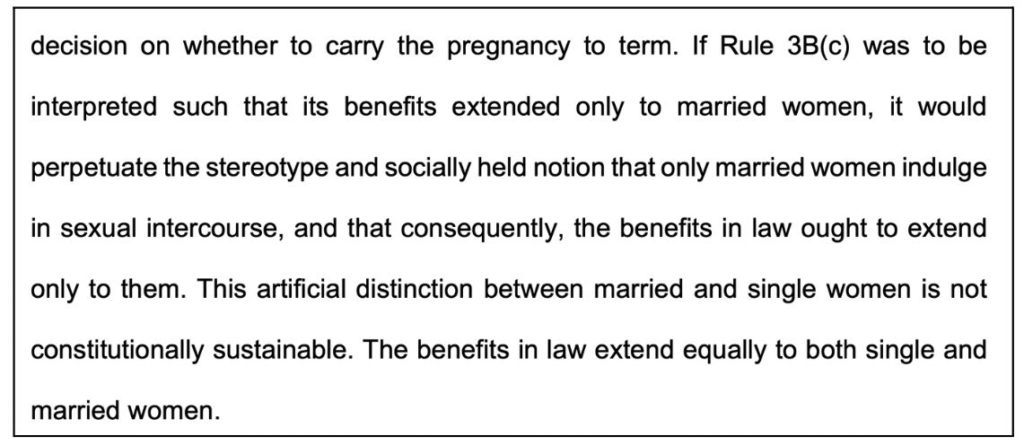
As per the case details, a 25-year-old unmarried woman approached the Delhi High Court seeking termination of her pregnancy of 23 weeks. She stated that her pregnancy was the result of a consensual relationship. However, she could not give birth to the child as she is an unmarried woman, and her partner has refused to marry her.
The Delhi High Court refused to provide relief to her and noted that unmarried women, whose pregnancy was the result of a consensual relationship, were not covered under any clause of MTPR, 2003.
Rule 3B of MTPR mentions the categories of women who are covered under it. These categories were included as part of the amendment made in 2021. The categories include – Survivors of sexual assault or rape or incest, minors, change of marital status during ongoing pregnancy, women with physical disabilities, mentally ill women, foetal malformation, and women with pregnancy in humanitarian settings or disaster or emergency situations.
The woman approached the Supreme court, which passed an ad-interim order allowing her to abort the pregnancy subject to the decision of the medical board constituted by AIIMS Delhi.
The Supreme court bench comprising of Justices D.Y. Chandrachud, A.S. Bopanna and J.B. Pardiwala was of the view that the Delhi High court took a restricted view in interpreting the rules.

The bench was of the opinion that there must be a purposive interpretation and took cognizance of the amendment, which substituted the word ‘partner’ instead of ‘husband’. The bench observed that the law must be interpreted keeping in mind the changing social norms. When MTP Act was enacted in 1971, it was largely related to married women, but with the changing societal norms, the law also needs to adapt and recognise legally non-traditional family structures.
Delhi HC: ‘Parental Consortium’ available to all children irrespective of whether they were dependent on deceased or not.
Justice Gaurang Kanth, of Delhi High Court, in the case Kanti Devi & Ors vs. New India Assurance Company Ltd & Ors., observed that in cases of Motor accident deaths, the parental consortium is available for all children irrespective of their dependency on the deceased.
As per the case details, a plea was filed with the Delhi High court challenging an order passed by Motor Accident Claims Tribunal. As per the order, compensation was awarded to 4 dependants of the deceased, who died in a motor accident.
The Insurance company was directed to pay compensation of Rs. 9.83 lakhs along with interest to 4 dependents of the deceased. The deceased was 44 years of age at the time of the accident and was survived by 7 children. The Tribunal considered only 4 children who were minors to be eligible for the parental consortium. It ignored two married daughters and a major son.
A plea was filed in Delhi High Court to enhance the compensation and include all 7 children of the deceased. The plea was based on Supreme Court’s ruling in National Insurance Co. Ltd vs. Pranay Sethi & Ors.
The parental consortium is granted to the child on the premature death of a parent for the loss of parental aid, protection, affection, society, discipline, guidance, and training.
The High Court relied on the Supreme Court Judgment in Magma General Insurance Company vs. Nanu Ram alias Chuhru Ram and observed that all the children of the deceased were entitled to the consortium under the head Parental Consortium. The court enhanced the compensation awarded by the Tribunal from Rs. 9.83 lakhs to Rs. 15.08 lakhs.
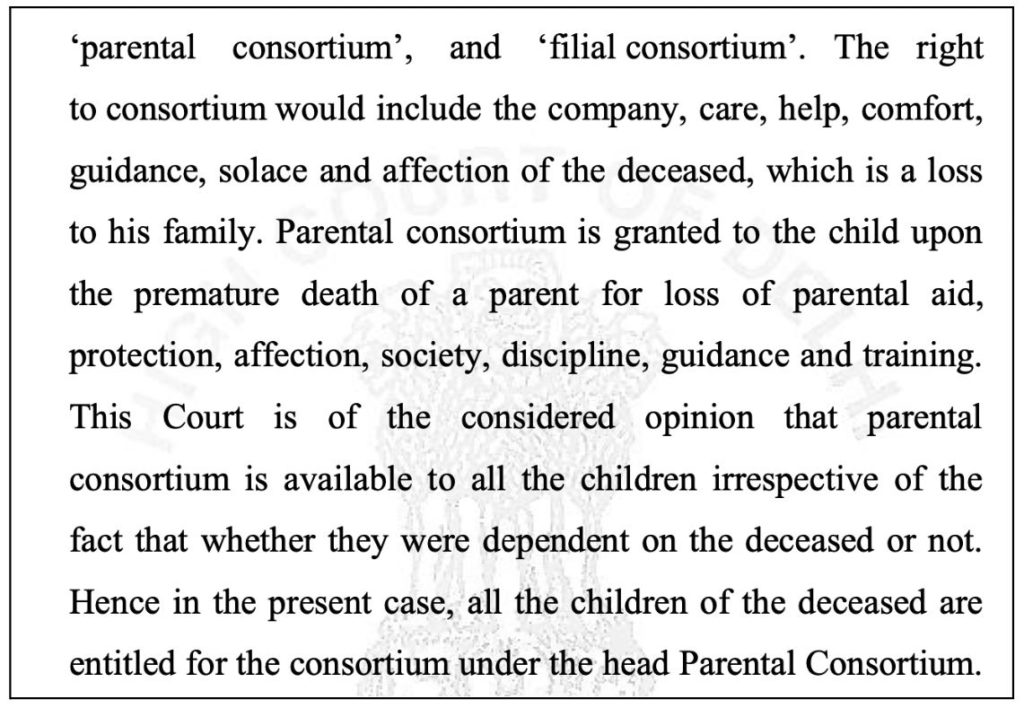
Bombay HC: State’s obligation to protect citizens from wild animal attacks.
The Bombay High court said that while it is State’s responsibility to protect wild animals, it is also obligatory for the state to protect the citizens from any injuries by the wild animals.
A division bench comprising of Justice G. S. Patel and Justice Gauri Godse, made the observation in the case, Anuja Arun Redij vs. State of Maharashtra. A writ petition was filed by a woman challenging the State’s refusal to compensate her for the death of her husband, who was attacked by a wild boar. The petitioner’s husband died in a road accident caused by a wild boar attack. As per the FIR filed and panchnama conducted by the police, the wild boar attacked and collided with the two-wheeler of the victim, which resulted in a fatal accident.
Her application for compensation of Rs.10 lakh was rejected by the Regional Forest Officer, stating that the information was not given within 48 hours of the incident and that the panchnama was not conducted in the presence of the forest officer.
She approached the Court after the state minister for forest did not respond to the representation. The petition stated that there was no dispute about the accident, and it was unfair to not grant compensation based on technical reasons. The State in its argument presented that the death was caused by head injuries in the road accident and not the wild boar attack.
The Division Bench observed that there was no other cause of the accident except for the boar, as per panchnama and stated that the reason for refusing the application is unjustified. It observed that while, Wildlife (Protection) Act, 1972 makes it an obligation for the State to protect wild animals, it is also its obligation to protect the lives of citizens under Article 21 of the Constitution.
It ordered the state to pay the compensation along with additional compensation for the litigation charges.
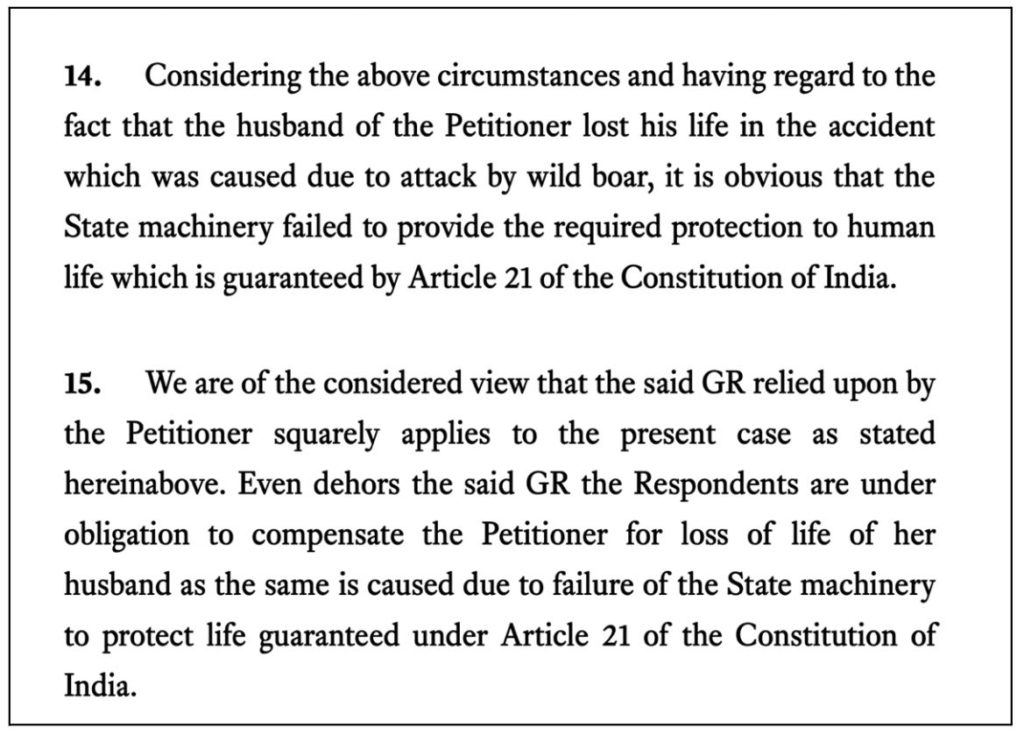
Supreme Court: Acquits man convicted for alleged rape & murder of Minor girl, as the death sentence was imposed without any evidence
A Supreme Court bench comprising of Justices S. Abdul Nazeer, AS Bopanna and Ramasubramanian, acquitted a man who was sentenced to death for allegedly raping and murdering a six-year-old girl.
The court observed that there were contradictions in the prosecution witnesses which were completely overlooked by both the Trial Court and the High Court. The case against the accused was that he took his niece aged about 6 years on the pretext of showing her a dance and song performance on the occasion of Holi and thereafter raped and killed her.
The sessions court convicted him for the offences punishable under Sections 302 and 376 of the IPC and awarded the death penalty. His appeal in the Allahabad High Court was dismissed and the court confirmed the death sentence.
The appeal in the Supreme Court raised contentions regarding – the trustworthiness of testimonies and the contradictions, the consequences of delay by Police in forwarding the FIR to the court, the failure of the prosecution to produce any forensic or medical evidence, the manner of questioning and the findings recorded.
The Supreme court observed that the stand of the accused since the beginning was that he was implicated in the case falsely at the behest of a locally powerful person. The bench also noted several contradictions regarding – the place where the police first saw the body, the person who took the dead body, the place to which the dead body was taken, different versions regarding place, date and time of conduct of inquest, etc. The court observed that these contradictions render the evidence of prosecution witnesses completely untrustworthy.
It also highlighted the delay of 5 days in transmitting the FIR to the jurisdictional court. The bench also observed that the accused is so poor that he could not afford the engage a lawyer even in the Supreme Court. The services of an amicus were provided only after repeated requests. The bench criticised the prosecution for not conducting the investigation properly.
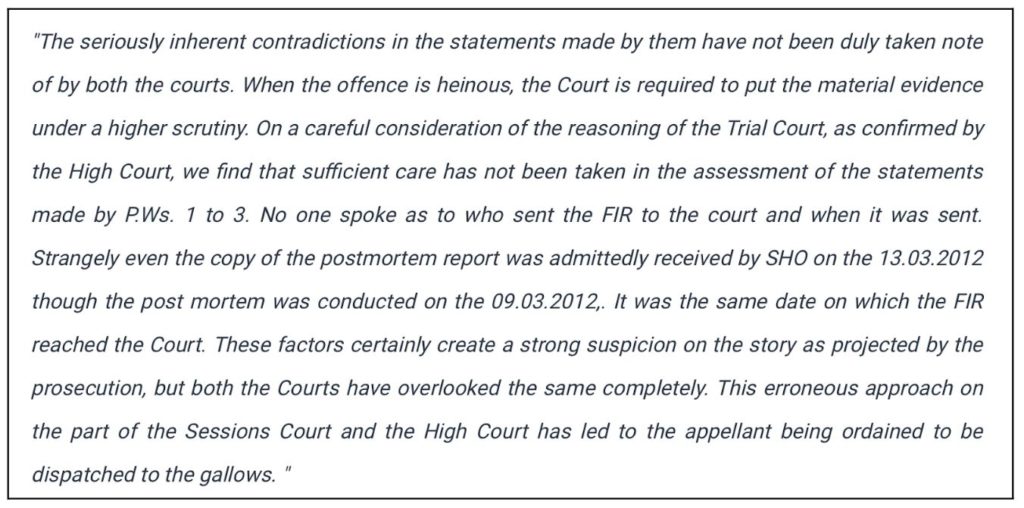
Bombay HC: Custodial interrogation is not imperative merely because offence is murder.
In the case, Santosh s/o Ananada Mane @ Chhotu vs. The State of Maharashtra, the court observed that the custodial interrogation of an accused is not mandatory merely because he’s been booked in a murder case.
As per the case details, a complaint was filed by Manoj Kumar Dubey in May 2019 after he learned that his brother Sanjay was assaulted with swords and Hockey sticks. He rushed to the spot and learned that Santosh Mane and three others had assaulted Sanjay. He also claimed that this brother had earlier spoken about a prevailing enmity and how the police were not acting against Mane.
The accused in the complaint, Mane approached the Bombay High Court seeking pre-arrest bail. The application of bail was on the ground of the completion of the investigation, the limited role of the conspiracy being attributed to him and the chargesheet being filed also against the co-accused.
Justice Dangre, presiding over the case observed that Mane was not one of the three assailants as per the chargesheet and in the CCTV footage. The police allege that the deceased was assaulted at the behest of Mane. However, the chargesheet does not specify the exact role of Mane.
The Judge observed that the material in the chargesheet falls short of establishing a connection between the deceased and Mane. Therefore, the applicant of the bail i.e., Mane deserves protection from arrest.
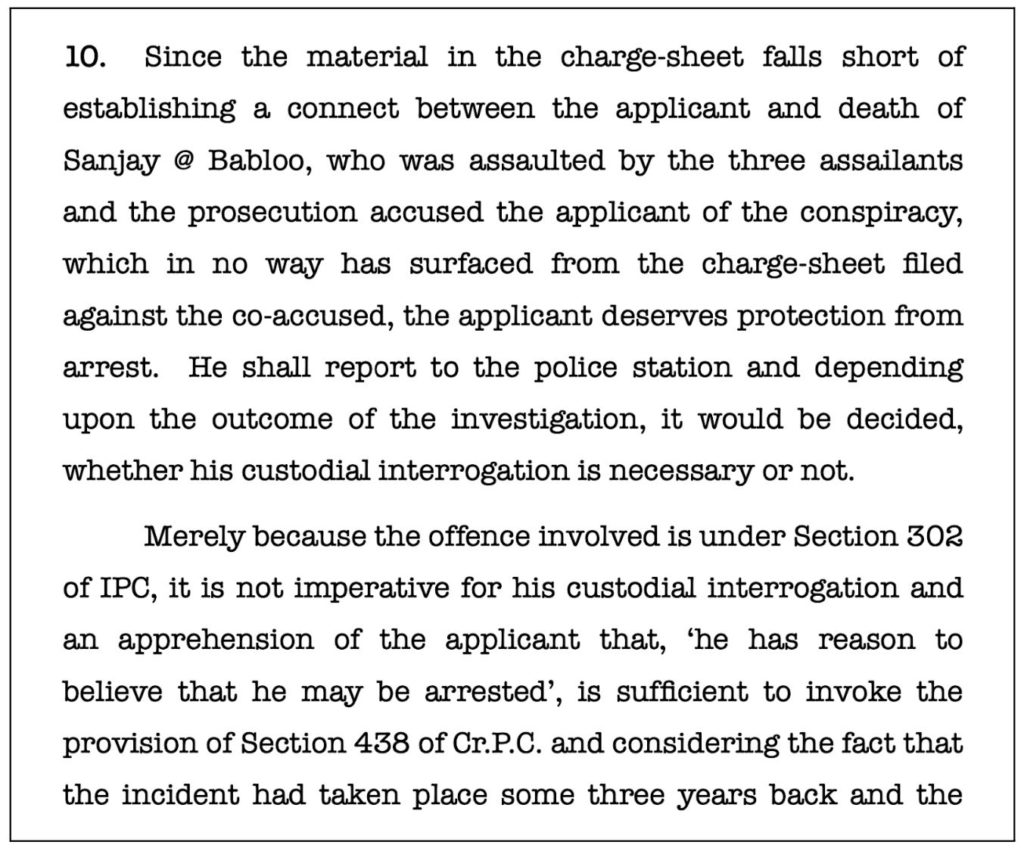
Featured Image: Review of Court Judgments


